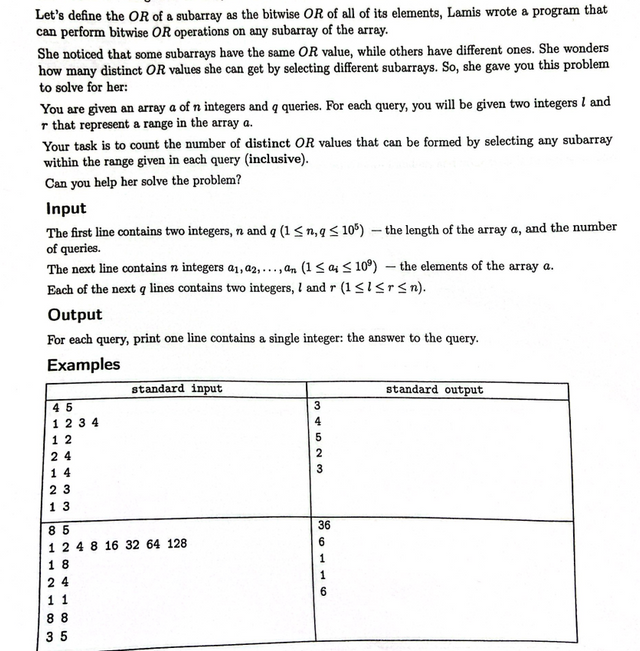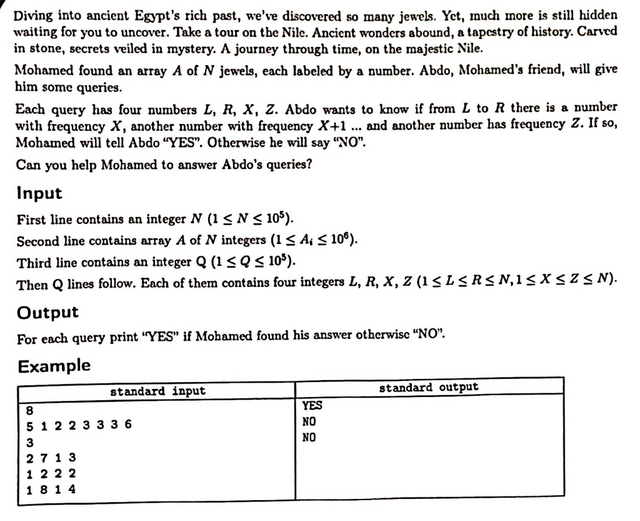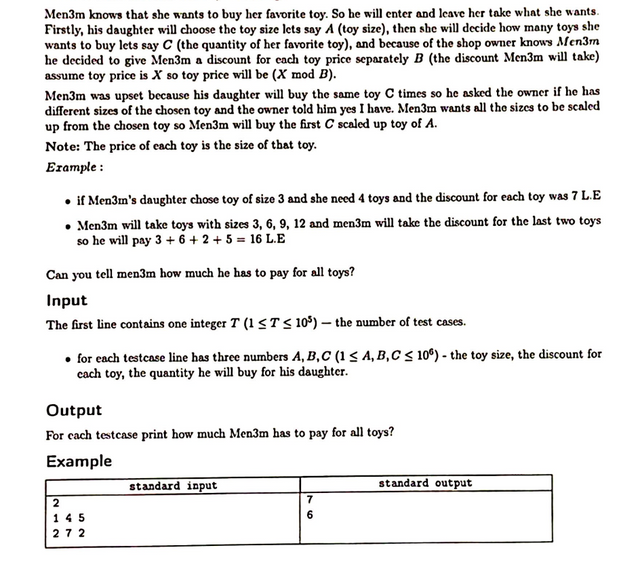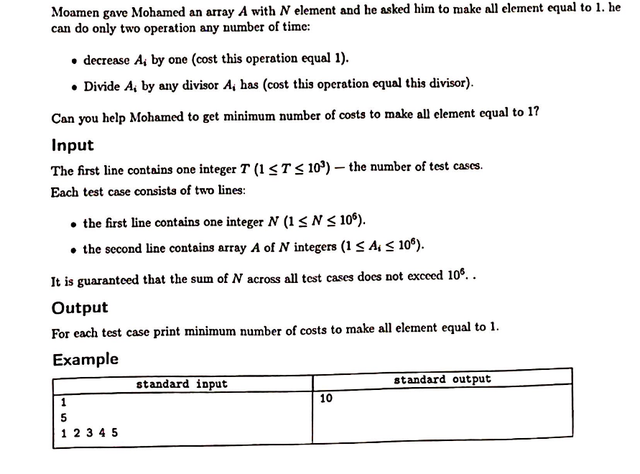Codeforces Round 977 (Div. 2, based on COMPFEST 16 - Final Round)
07:23:04
Register now »
| # | User | Rating |
|---|---|---|
| 1 | tourist | 4009 |
| 2 | jiangly | 3839 |
| 3 | Radewoosh | 3646 |
| 4 | jqdai0815 | 3620 |
| 4 | Benq | 3620 |
| 6 | orzdevinwang | 3612 |
| 7 | Geothermal | 3569 |
| 8 | ecnerwala | 3494 |
| 9 | Um_nik | 3396 |
| 10 | gamegame | 3386 |
| # | User | Contrib. |
|---|---|---|
| 1 | Um_nik | 164 |
| 2 | -is-this-fft- | 162 |
| 3 | maomao90 | 159 |
| 3 | atcoder_official | 159 |
| 5 | cry | 158 |
| 5 | awoo | 158 |
| 7 | adamant | 155 |
| 8 | nor | 154 |
| 9 | TheScrasse | 153 |
| 10 | Dominater069 | 152 |
Hello codeforeces, I was trying to upsolve the ECPC Q day 2 and I am stuggle with this problem and need some help please.
I am thinking of using mo's algorithm but I can't solve this problem. Can any one help me please?
Hello codeforces, I am up-solving ECPC qualifications day 2 and i need some help in problem D.
After trying some tests i found that there is a pattern that repeat. and all the numbers between 0 and B-1 that is divisible by the GCD(A,B). And by the way I can easily calculate the the length of this cycle and also the sum of its number. the length = B/GCD(A,B) and the sum = (length*(length - 1)/2) * A Now we can solve the repeated cycles easily. But my problem is how to calculate the tail of it in O(1) .. i.e. lets say A = 1, B = 7, C = 10 ... we have only one repeated cycle which is from 0 to 6 and after that we will have remaining 3 number from the cycle. so we will need to calculate this what i call tail in O(1). as O(N) will get TLE due to the high test cases numbers.
Can anyone please help me with this problem?
Hello codeforces. I am trying to upsolve the problems of qualification day2 of ECPC and i need some help on this problem.
The solution that i implemented was a dp solution where dp[i] is the answer for i. so before run any testcase i calculate the dp from 1 to 1e6, and to do this i cal min(dp[i-1]+1, dp[i/j]+j) where j is every divisor of i.
I tried different codes to make this fast and the fasted code that came in my mind was by generate all the prime divisors of i and then calculate the all the divisors of each i from its prime divisors.
But even this code take around more than 3 seconds on my machine. Can anyone please help me with this problem? I want to know if my idea was right and if so will this solution pass in the contest? unfortunately they don't write the time for each test case
#include <bits/stdc++.h>
using namespace std;
#define INF 1e18
using ull = unsigned long long;
using ll = long long;
using ui = unsigned int;
#define endl '\n'
#define newl cout<<endl;
void ICPC();
#define N 1000001
int dp[N+10];
int sp[N+10];
bool primes[N+10];
vector<int> getPD(int x) {
vector<int> ret;
while(x > 1) {
ret.push_back(sp[x]);
x /= sp[x];
}
return ret;
}
vector<int> st;
vector<int> tmp;
void genDiv(int ind, int val) {
if(ind == tmp.size()) {
st.push_back(val);
return;
}
genDiv(ind+1, val);
genDiv(ind+1, val*tmp[ind]);
}
signed main() {
ios_base::sync_with_stdio(false); cin.tie(NULL);
memset(primes, 1, sizeof(primes));
primes[0] = primes[1] = 0;
sp[1] = 1;
for(int i = 2; i <= N; i+=2) sp[i] = 2;
for(ll i = 3; i <= N; i+=2) {
if(primes[i]) {
sp[i] = i;
for(ll j = i; j*i <= N; j+=2)
if(primes[j*i]) primes[j*i] = 0, sp[j*i] = i;
}
}
dp[0] = dp[1] = 0;
for(int i = 2; i < N; i++) {
dp[i] = dp[i-1]+1;
tmp = getPD(i);
st.clear();
genDiv(0, 1);
for(auto &x : st) {
dp[i] = min(dp[i], dp[i/x]+x);
}
}
int t = 1;
cin >> t;
for(int i = 1; i <= t; i++) {
ICPC();
newl;
}
}
void ICPC() {
int n;
cin >> n;
int ans = 0, tmp;
for(int i = 0; i < n; i++) {
cin >> tmp;
ans += dp[tmp];
}
cout << ans;
}
Hello codeforces. I noticed that most of Experienced Programmers prefer Iterative DP over Recursive one. I Know that some hard problem need space optimizations that can be done in iterative only. But I found that they always use the iterative DP. I see that the recursive DP is much easier. So what is the real purpose of that? Is the iterative solution is easier for them !?
| Name |
|---|














